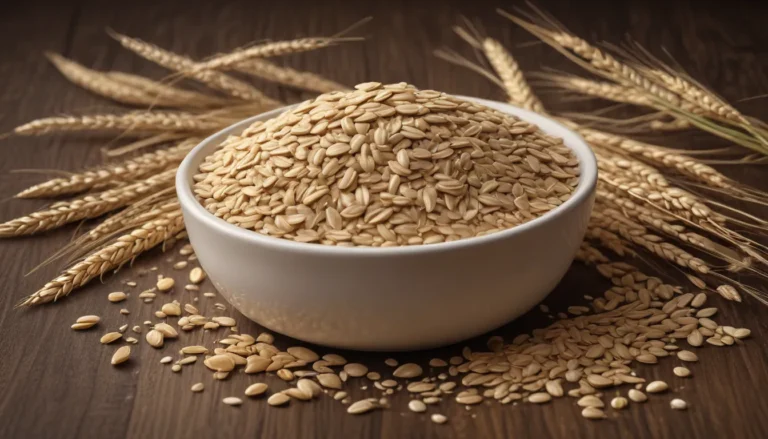The pictures in our articles might not always show exactly what the text is talking about. We use these images to make the article more interesting and eye-catching. They are there to add to the text, but not to replace it or show every detail.
Wheat, a fundamental crop that has been cultivated for millennia, holds a prominent place in our daily lives. Often associated with bread and pasta, wheat boasts a rich history and a multitude of intriguing qualities that go beyond its culinary uses. In this article, we dive deep into the world of wheat to uncover 11 surprising facts that will enhance your appreciation for this versatile grain.
The Ancient Beginnings of Wheat
Wheat has its origins in the Fertile Crescent, a region that spans modern-day Iraq, Syria, and Turkey. It is one of the oldest cultivated crops, with evidence of its cultivation dating back to around 10,000 B.C. This ancient grain has played a vital role in the development of human civilization and continues to be a staple food for billions of people worldwide.
Wheat’s Global Influence
Wheat is one of the most widely grown crops globally, occupying more land area than any other grain. It serves as a staple food for many communities and is a vital source of nutrition in various countries around the world. From the farmlands of America to the rice fields of Asia, wheat plays a crucial role in feeding populations worldwide.
The Diversity of Wheat Varieties
With thousands of varieties available, wheat comes in various forms, each with its unique characteristics. From hard red wheat to soft white wheat and durum wheat, the diversity of wheat varieties allows for a wide range of culinary applications. Whether you're baking bread, making pasta, or brewing beer, there is a wheat variety suited to your needs.
Exploring the Versatility of Wheat
Wheat is an incredibly versatile grain that finds its way into numerous food products. From flour and semolina to bulgur and couscous, wheat takes on many forms in the culinary world. It serves as a key ingredient in baked goods, pasta, breakfast cereals, and beverages like beer, showcasing its adaptability in various food industries.
The Nutritional Benefits of Wheat
Wheat is a nutritional powerhouse, packed with essential nutrients such as carbohydrates, fiber, protein, vitamins, and minerals. Whole wheat, in particular, is a valuable source of dietary fiber, offering numerous health benefits, including improved digestive health and reduced risk of certain diseases. Including wheat in your diet can contribute to a well-rounded and nutritious eating plan.
Understanding the Gluten Controversy
Wheat contains gluten, a protein that can trigger adverse reactions in individuals with gluten-related disorders like celiac disease. However, for the majority of people, consuming wheat products is safe and poses no harm to their health. It's essential to be aware of gluten sensitivities and choose appropriate alternatives when necessary.
Wheat as a Symbol of Agriculture
Throughout history, wheat has symbolized fertility, abundance, and sustenance. It holds a significant place in cultural and religious practices worldwide, often featuring in harvest festivals and ceremonies that celebrate the agricultural cycle. Wheat's symbolism goes beyond its physical value, embodying the essence of sustenance and prosperity.
The Genetic Diversity of Wheat
Wheat's genetic diversity has been crucial in its adaptation to various climates and environments. Scientists are continuously studying and enhancing wheat varieties to improve yield, resistance to pests and diseases, and nutritional content. This ongoing research plays a vital role in ensuring the sustainability and productivity of wheat crops worldwide.
Developing Drought-Resistant Varieties
In regions prone to water scarcity, drought-resistant wheat varieties have been developed to withstand arid conditions. These varieties play a crucial role in ensuring food security and agricultural sustainability in challenging environments. By cultivating wheat varieties that can thrive in drought-prone areas, farmers can mitigate the impact of water shortages on crop yields.
Wheat’s Economic Impact
Wheat is a significant contributor to the global economy, generating billions of dollars in trade and supporting livelihoods across the agricultural sector. It plays a pivotal role in food security and economic stability in many countries, providing sustenance and economic opportunities for millions of people worldwide. The cultivation and trade of wheat have far-reaching impacts on both local and global economies.
Embracing the Legacy of Wheat
From its ancient origins to its modern-day significance, wheat continues to play a vital role in our lives. Its nutritional value, versatility, and economic impact make it an indispensable part of our daily diet and global food system. As you savor a slice of bread or enjoy a bowl of pasta, take a moment to reflect on the incredible journey of wheat and appreciate its enduring influence on our world.
Frequently Asked Questions (FAQs) about Wheat
Is wheat the same as gluten?
- Wheat contains gluten, but gluten is not exclusive to wheat. It is also found in barley and rye, while wheat specifically refers to the grain itself.
What are the health benefits of whole wheat?
- Whole wheat is rich in fiber, promoting digestive health, regulating blood sugar levels, and potentially reducing the risk of heart disease and certain cancers.
Can wheat be grown in all climates?
- Wheat exhibits adaptability to various climates, from temperate regions to arid environments, depending on the specific wheat variety being cultivated.
How long does it take for wheat to grow?
- The growth cycle of wheat varies depending on factors such as the wheat variety and environmental conditions. Typically, it takes around 90 to 120 days from planting to harvest.
Can individuals with gluten sensitivities consume wheat?
- Individuals with gluten sensitivities or intolerances may need to avoid wheat or opt for gluten-free alternatives like gluten-free flour or grains to manage their condition effectively.
In conclusion, wheat's journey from ancient origins to modern-day significance is a testament to its enduring legacy and importance in our lives. With its nutritional richness, adaptability, and diverse uses, wheat continues to nourish and sustain us in countless ways. Let's celebrate the remarkable story of wheat and its role in shaping our world.






